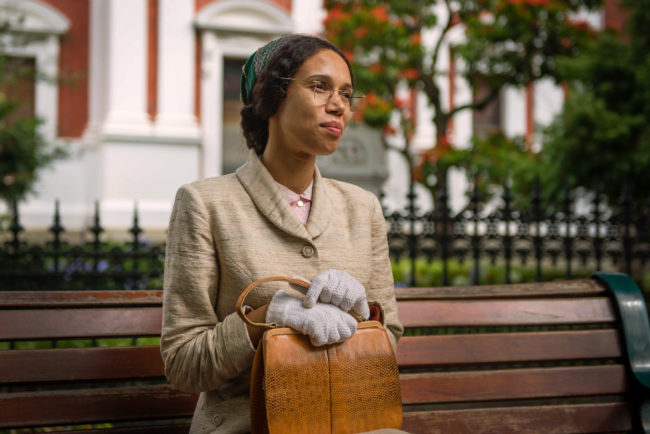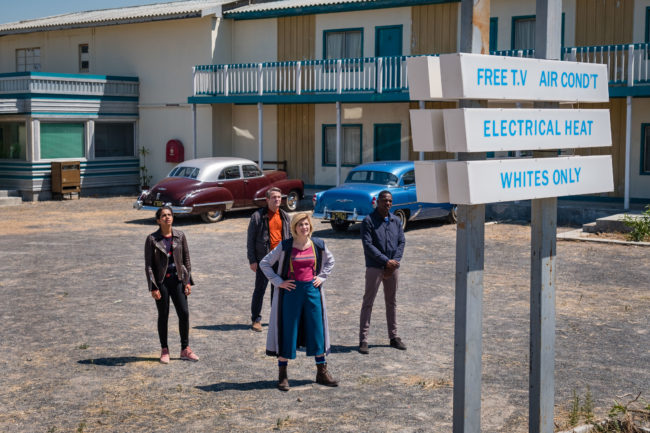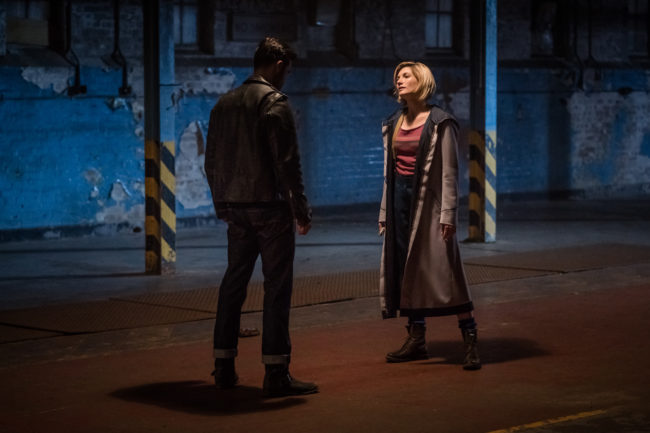Previously on Doctor Who, “The Ghost Monument”
This week’s Doctor Who takes a trip back to Rosa Parks’ Montgomery, Alabama as a malevolent force tries to change history. Such a topic understandably brought with it viewers’ concerns, as this is British entertainment, not American, and showrunner Chris Chibnall is, although different and new, still a white male. In answer, it seems Chibnall took care to present Parks’ life respectfully, giving the director’s chair once again to Mark Tonderai and sharing the writer’s pen with Carnegie Medal winner Malorie Blackman, who are both black, albeit British. Minus alien shenanigans, the script essentially follows the historical timeline and uses exact reported quotes. Even her opening conflict with the same bus driver 12 years prior, which might stretch credulity for those unaware of the full events, is accurate: the same driver, James Blake, who left her on the sidewalk in 1943, also asked her to stand in 1955. Perhaps the biggest creative leap of the episode is Parks’ secret meeting the night before with attorney Fred Gray and Martin Luther King, Jr., although Parks had at least met King before these events.

Images: BBC America
The episode confronts oft repeated time-travel complaints, when the Doctor trots companions of color out into a rampantly racist time and they seem to walk around in a bubble, untouched by the world save a comment or two. No such luck here, when, within moments of landing, a white man assaults Ryan for picking up his wife’s handkerchief out of politeness and threatens his life, distracted only by Rosa Parks swooping in to assure him that his suit would be ready soon. That tension never lets up, leaving viewers and Ryan in a perpetual state of anxiety.
As the Doctor hauls her crew through the usual investigation, racism on the edge of boiling over waits at every corner: the diner, the motel, the street, the bus… Every time Ryan walks out of sight, we agonize over whether this is a good idea, whether the Doctor is harmfully oblivious to his safety. Montgomery residents give the crew a tiny berth due to their British accents, but as Rosa points out after their first confrontation, Emmett Till was also a visitor to the area, so there is no relief. Even Yaz is unsure of her standing, hiding from the police and thrown out of the diner for being “Mexican,” yet tentatively allowed to sit in the Whites Only section on the bus. While hiding behind a dumpster from a policeman searching the Doctor’s motel room for them, the two share a painful discussion of how racism affects their regular lives back home, saying that things don’t change for good after 1955, but rather get better ever so slowly.

Where “Rosa” shines is through Vinette Robinson’s fantastic portrayal of Rosa Parks and Tosin Cole’s (Ryan) nervous determination to see this through as she would, despite his earlier foggy memory on Parks because, “She’s American.” Parks is suspicious but tolerant of the Doctor’s weird intensity, but patiently allows Ryan into her meeting with Gray and King, sending Ryan into stuttering awe, and lets him see how tired she really is. The Doctor does not lurk all over her, peppering her with aphorisms as some past Doctors might have done, but focuses on giving her the chance and opportunity to make her decision. In fact, the Doctor, Graham, and Yaz are unwittingly and unwillingly forced to become part of the problem by maintaining their seats so the bus is full. No magical thinking is transmitted to the bus driver or Montgomery’s inhabitants, which might have otherwise given the Doctor credit in our minds. It is entirely Rosa Parks’ moment, and when she continues to sit while the bus driver rushes off to call authorities, “Rise Up” by Andra Day swells, pushing any holdouts on tears and goosebumps over the edge. To complete the narrative, the Doctor plays videos from Parks’ future on the TARDIS screen, ending with her receiving the Presidential Medal of Freedom from President Clinton in 1996, and wraps with her universal significance, opening the TARDIS door to show off Asteroid 284996, named for her.

If anything, in its efforts to maintain accuracy and focus on Rosa Parks, the episode falters in its B storyline, the alien “threat” itself. A parolee from Stormcage Containment Facility named Krasko, dressed as a greaser, attempts to change tiny details leading up to the fateful moment “where it started to go wrong.” His motivation seems to be keeping this key event of the racial equality movement from occurring, but it is unclear how that would even affect someone 50 millennia into the future. His efforts are impotent by design, as he is unable to actually kill anyone (again) thanks to an implanted inhibitor, so they are relatively easy for the Doctor and her friends to outwit. Even his weapon can only displace its victim in time. When the Doctor confiscates it and offhandedly explains how to set the timer, it becomes Chekhov’s blaster for Ryan to whip out in the final act and remove Krasko from the playing field, perhaps for another confrontation later in the season. Sure, it’s fun that Krasko uses the same time tech favored by Time Agents like Captain Jack Harkness and Captain John Hart (Torchwood) and that he’s leaving Artron energy trails around town, but that’s about it. Perhaps the message from Doctor Who is that this 52nd Century angry white male is irrelevant, as are his attempts, like those in 1955 and today, to stymie progress.
Graham gets a few notable character building moments, recalling how Grace immediately told him that he better not be the James Blake brand of bus driver and getting choked up over the memory of her Spirit of Rosa t-shirt. He tells half of Montgomery that Ryan is his grandson and swallows his retorts about Blake’s hatred while cajoling the man into keeping his route, only to later use it against him by hauling Ryan to Blake’s fishing spot and announce they’d be there all day. He also sets off a rolling joke with the Doctor when he chides her for writing on the hotel wall, saying she’s not Banksy, to which she replies coolly, “Or am I?” After the policeman leaves their motel room, distracted by Graham’s claims that he’s Steve Jobs here to pitch his invention for a cell phone, the Doctor unveils the graffiti with her sonic screwdriver, quipping…
“Banksy doesn’t have one of those… Or do I?”
Trivia, Questions, & References
- The Doctor name drops Elvis and Frank Sinatra, saying she gave both mobile phones, and gets VIP tickets from Sinatra to get Blake’s replacement driver out of the way.
- Banksy was also mentioned in another Chibnall-written episode, “The Power of Three.”
- Vortex manipulators favored by Krasko, River Song, and Time Agents are known for their addictive properties. In the comic Space in Dimension Relative in Time the Eleventh Doctor says he used to go through 40 a day.
- River Song was sentenced to 12,000 consecutive life sentences in Stormcage for what everyone thought was her murder of the Eleventh Doctor at Lake Silencio and eventually earned a pardon before the events of “The Angels Take Manhattan.”
- Artron energy is present in the time vortex as a type of background radiation and assists in Time Lord regeneration.
- Vinette Robinson was previously on Doctor Who in the Tenth Doctor episode “42,” Chibnall’s first writing credit for the series.
- What do the initials GFB on Krasko’s suitcase stand for?
- The old man Ryan tries to convince to get on the bus is played by Morgan Deare, who previously played Hawk in the Seventh Doctor’s episode arc “Delta and the Bannermen,” which incidentally was also set in the 1950s with a Greaser bad guy.
Doctor Who S11E3 Score
-
Plot – 9/10
-
Action – 8/10
-
Performances – 9.5/10
-
Aliens – 5/10
7.9/10
"Rosa"
Starring: Jodie Whittaker, Tosin Cole, Mandip Gill, Bradley Walsh, Vinette Robinson, Josh Bowman, Morgan Deare, David Dukas, Mark Hugh-Williams, Richard Lothian, Gareth Marks, Aki Omoshaybi, Jessica Preddy, David Rubin, Ray Sesay, Trevor White | Director: Mark Tonderai | Writers: Malorie Blackman, Chris Chibnall




